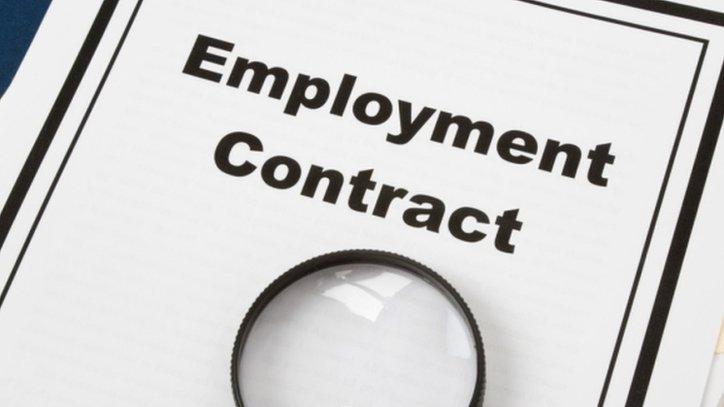Cable warns of exploitation of zero-hours contracts
- Published
- comments
Business Secretary Vince Cable: "I think at one end of the market there is some exploitation taking place"
The Business Secretary Vince Cable fears zero-hours contracts are being abused after research suggested a million people could be working under them.
Mr Cable said he was concerned there was "some exploitation" of staff on the contracts which give no guarantees of shifts or work patterns.
The Chartered Institute of Personnel and Development found up to 4% of the UK workforce were on such contracts.
It surveyed 1,000 firms.
"I think at one end of the market there is some exploitation taking place," said Mr Cable.
However, he pointed out that in many cases the level of flexibility offered by the contracts suited employees. "It can work for the worker as well as the employer," he told the BBC.
Formal consultation?
Mr Cable has been leading a review on the issue for the government since June and will decide in September whether to hold a formal consultation on specific proposals.
Unions have called for them to be banned.
Dave Prentis, general secretary of the Unison union, said: "The vast majority of workers are only on these contracts because they have no choice. They may give flexibility to a few, but the balance of power favours the employers and makes it hard for workers to complain."
Despite controversy over their use, just 16% of those affected said their employer often fails to provide them with sufficient hours each week.
This was higher amongst those who described themselves as part-time, where 38% said they would like to work more hours.
Under zero-hours contracts employees agree to be available for work as and when it is required.
Positive role
Figures from the Office for National Statistics last week, external suggested 250,000 workers were on zero-hours contracts.
CIPD chief executive Peter Cheese said the reason his survey showed up to four more times the number of people on zero hour contracts compared to official figures could be down to a lack of precision in the measurement, as well as confusion over definitions.
"I think even sometimes employers themselves are not fully clear on the absolute nature of their contracts and whether it is genuinely zero hours," he said.
"There does need to be a closer look at what is meant by a zero-hours contract, the different forms that they take, and clearer guidance on what good and bad practice in their use looks like.
"Zero-hours contracts, used appropriately, can provide flexibility for employers and employees and can play a positive role in creating more flexible working opportunities.
"However, for some this may be a significant disadvantage where they need more certainty in their working hours and earnings... Zero-hours contracts cannot be used simply to avoid an employer's responsibilities to its employees."
The news emerged as it was reported that part-time staff at retailer Sports Direct and a number of London councils were among those employed on such terms.
Fluctuating wages
According to the CIPD's research, firms in the voluntary and public sectors were more likely to use zero-hours contracts than those in the private sector.
The industries where employers were most likely to report having at least one person on a zero-hours contract were hotels, catering and leisure, education and healthcare.
The CPID said one in five employers in the UK had at least one person on a zero-hours contract. This means workers can be officially counted as employed, but have no guaranteed paid work and can be sent home from their workplace without warning and without having earned anything.
While zero-hours contracts may suit some due to the flexibility they provide, critics point out that the system can lead to fluctuating wages and a risk that managers may use their contract as both reward and punishment.

Rochelle Monte is a care worker on a zero-hours contract and she told Radio 4's Today Programme that she gave her employer details of her availability and then had to "hope for the best".
"It can change dramatically over the space of a week.
"So you might start off a week thinking you've got 40 hours, but by the end of the week you could be down to 12," she said.
Colin Angel from the UK Homecare Association said zero-hours contracts were a response to the way that local authorities commissioned home care services.
"Councils buy 70-odd percent of all hours of home care - and it's proved to be the way that you can retain a workforce who are available very flexibly whose hours can change over a month.
"[It] works well for care workers who largely appreciate the flexibility that their contracts have," he said.
CIPD's Peter Cheese: A zero-hour contract is about flexibility
At places of employment found to be using the contracts, the average number of workers who were on them was around 16%, according to CIPD.
Based on these figures, CIPD calculated that between 3% and 4% of all workers were on zero-hour contracts - equating to a million people in the UK labour force.
The employees who took part in the poll worked an average of just under 20 hours a week and were most likely to be aged between 18 and 24 or over 55.
- Published5 August 2013

- Published1 April 2015

- Published15 May 2013

- Published28 April 2013

- Published19 September 2012
